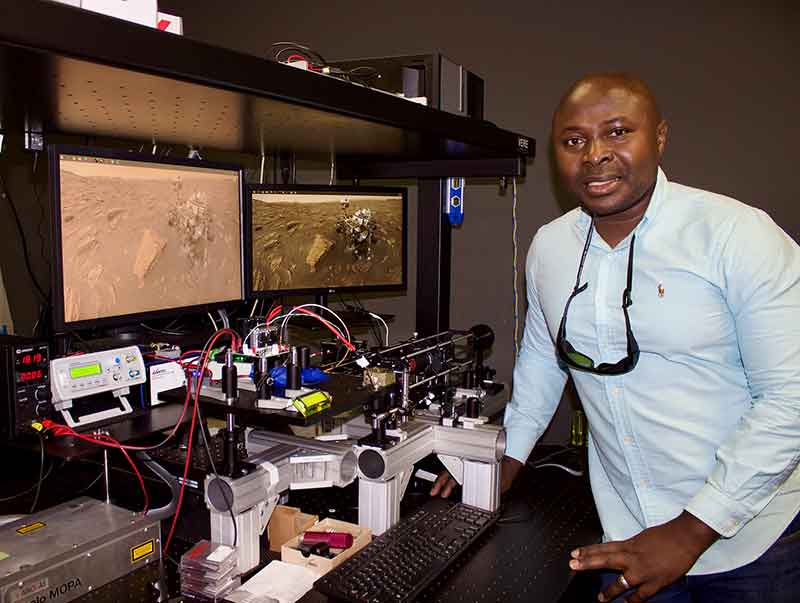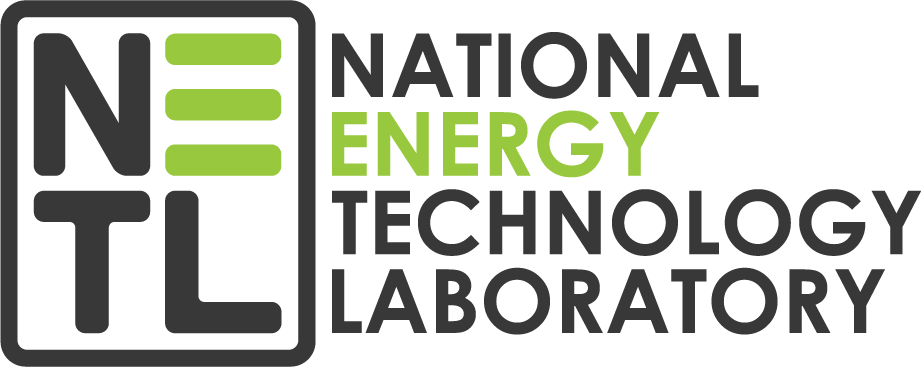Physicist develops laser technology to analyze groundwater and help the sick
Meet Christian L. Goueguel
STEM was always on the mind of a young Christian L. Goueguel, Ph.D. in physics, eventually leading to a lifelong passion for laser spectroscopy, a prolific career in research, engineering and several published articles. He first received his doctoral degree at the Institut national de la recherche scientifique (“National Institute of Scientific Research”) in Canada. After, Goueguel worked as a postdoctoral researcher at Carnegie Mellon University in partnership with the National Energy Technology Laboratory (NETL) for two years, where he was encouraged to take a fellowship with Oak Ridge Institute for Science and Education (ORISE) by his soon to be mentor, Dustin L. McIntyre, Ph.D.

Christian L. Goueguel, Ph.D. in physics, researches and develops laser-induced breakdown spectroscopy through the National Energy Technology Laboratory (NETL) Postgraduate Research Program for near-surface monitoring in geological carbon sequestration. This technology may one day be used for medical diagnostic tools. (Credit: Christian L. Goueguel, 2022)
NETL offers opportunities to participate in energy-related research. Its mission is to strengthen our nation’s security, to improve our nation’s environment and to advance energy options that fuel our nation’s economy.
Under the mentorship of McIntyre, Goueguel began his research as a participant in the NETL Research Participation Program, focusing primarily on laser-induced breakdown spectroscopy (LIBS), a type of analytical technique used to determine the elemental composition of materials. His research examined how this laser detection technology could be utilized to measure what saline groundwater was composed of and track trends within that. Goueguel and McIntyre were particularly interested in making fiber-based LIBS sensor analyzation simple and easy to preform, especially for monitoring CO2 intrusion into shallow groundwater, which can mobilize naturally occurring trace metals commonly contained in aquifer sediments.
“We have provided an explanation of the physical processes involved in the formation, expansion, and extinction of the micro-plasma, which have a significant impact on the exploitation of the LIBS analytical signal. Our observations have been later confirmed by other researchers who conducted similar experiments in saline waters,” said Goueguel. “The most gratifying impression I have is having been able to work with experienced researchers at NETL on a very exciting and forefront research topic, and to have contributed to the advancement of LIBS technology.”
During his three years of participation, Goueguel was proud of his assistance in publishing several scientific articles on the topic. He helped publish eleven research articles and two book chapters, one of which has since been published in “Laser-Induced Breakdown Spectroscopy (2nd Edition)” by Elsevier Science in 2020. He would then complete his fellowship with NETL in June of 2017.
After his fellowship, Goueguel returned to Canada, where he continued to work on LIBS technology as a research scientist. He has since moved up to a senior optical engineer. Now, Goueguel is currently developing a portable LIBS instrument for point-of-care testing, which may one day be utilized by healthcare professionals to make better and more effective decisions with their patients.
Goueguel gives a lot of credit to the ORISE participation program for helping him enhance his skills as a scientist. Using experiences he’d gotten from the program, such as employing the lab in a way that promotes careful planning, he’s been able to have a fruitful and passionate career as a scientist. Goueguel ended his interview by recommending the ORISE participation program to students.
“I strongly recommend that students considering a STEM internship in a federal research lab join the ORISE program. This program provides an exceptional environment in which to learn, work, and grow, which I believe will have a lasting impact on their careers.”
The NETL Postgraduate Research Program is administered by the Oak Ridge Institute for Science and Education (ORISE) for the U.S. Department of Energy (DOE). ORISE is managed for DOE by Oak Ridge Associated Universities (ORAU).


